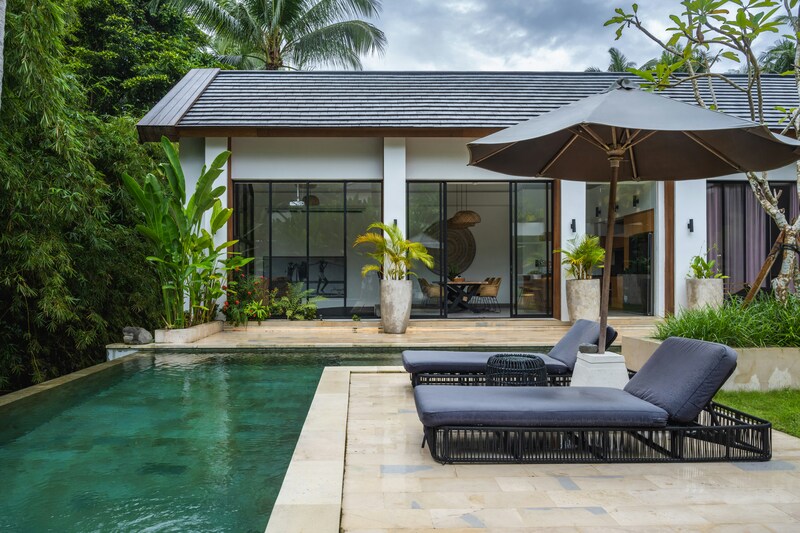Does the recent tourism influx on the Island of Gods also impact the latter’s real estate sector?
Bali has long been a popular destination for tourists and over the past few decades, the island’s tourism industry has only seen more exponential growth, drawing in millions of international visitors each year. This begs the question: does this influx impact other sectors, particularly real estate?
The brief answer is that this surge in tourism does, indeed, significantly impact the island’s real estate market, shaping it into a dynamic and lucrative investment landscape. As tourism in Bali reaches new heights in 2024, several key trends and challenges have emerged, highlighting the interplay between visitor influx and property dynamics.
Increase in Luxury Accommodations
The resurgence in tourism post-pandemic has fueled a robust recovery in Bali’s real estate market. By 2023, foreign tourist arrivals had reached approximately 1.03 million, driving up property transactions and stabilising prices. One of the most noticeable trends driven by this tourism boom is the rise of luxury accommodations. High-end resorts, boutique hotels, and upscale villas – particularly in areas such as Seminyak, Uluwatu, and Nusa Dua – have proliferated across the island to cater to affluent travellers seeking premium experiences.
These properties offer privacy, exclusivity, and amenities of a certain standard, making them highly attractive to both tourists and investors. This shift from traditional hotels to luxurious private stays is a testament to the evolving preferences of visitors looking for personalised experiences.
Developers have capitalised on this demand, investing heavily in the construction of new luxury resorts and the renovation of existing properties. While traditional tourist hotspots such as the likes of Seminyak and Ubud continue to thrive, new areas like Bingin and Uluwatu are gaining traction. These locations offer unique charms, stunning coastal views, and less crowded environments, making them attractive for boutique resorts and exclusive villas. Investing in these emerging areas allows for early entry into markets poised for significant growth, potentially yielding higher returns as these regions develop further.
Demand for Holiday Homes
In parallel with the luxury accommodation trend, there is a growing interest in holiday homes among international buyers. Many tourists are opting to purchase vacation properties in Bali as a way to enjoy extended stays on the island. This demand is driven by the desire for a second home that offers both a personal retreat and a lucrative rental opportunity when not in use. The consistent rise in property values, averaging 15-20% annually, further incentivises such investments. This trend has led to a significant increase in the number of private villas and condos available for short-term rental.
The popularity of platforms such as Airbnb and Vrbo has made it easier for property owners to market their holiday homes to a global audience. This rental income can be substantial, making the purchase of holiday homes a lucrative investment. Consequently, the market for such properties has grown rapidly, with many developments specifically targeting foreign buyers.
Luxury villas and high-end resorts are increasingly sought after by affluent travellers and investors looking for prime properties. The appeal of these luxurious options is evident in their popularity among expatriates and affluent locals, who seek premium homes close to top-notch amenities. This trend is reflected in the diversification of the market, which now offers a variety of housing options, from budget-friendly villas to upscale residences.
Balancing Development with Preservation
Although the growth in tourism and real estate development has brought economic benefits to Bali, it has also posed significant challenges, particularly in terms of environmental and cultural preservation. The rapid pace of development has sometimes come at the expense of Bali’s natural landscapes and cultural heritage, leading to concerns about sustainability.
One of the primary challenges is balancing the need for new accommodations with the preservation of Bali’s unique environment and cultural sites. Unchecked development can lead to deforestation, water scarcity, and pollution, threatening the island’s ecosystems and the very attractions that draw tourists in the first place. Additionally, the construction of large resorts and holiday homes can disrupt local communities and traditional ways of life.
These issues lead to a growing emphasis on sustainable and responsible tourism practices. Developers are increasingly adopting eco-friendly building techniques, such as using renewable materials, incorporating energy-efficient systems, and designing properties that blend harmoniously with the natural surroundings. Efforts to address these concerns also include the implementation of more stringent zoning regulations and the promotion of sustainable building practices to ensure that development is managed in a way that respects Bali’s cultural and environmental integrity. Moreover, the Indonesian government has also introduced relaxed foreign ownership laws, allowing more international investors to enter the market while encouraging responsible and sustainable development.
Impact of Infrastructure and Regulatory Environment
Infrastructure development plays a crucial role in supporting the real estate market’s growth. Projects such as new roads, international hospitals, and educational institutions enhance the island’s livability and investment appeal. These improvements not only boost local economies but also make previously less accessible areas more attractive for development. Additionally, navigating the regulatory environment, especially for foreign investors, remains crucial. Understanding Indonesian property laws and leveraging leasehold arrangements are essential for making informed investment decisions.
Commercial Real Estate: A Growing Sector
Beyond residential properties, Bali is witnessing a surge in commercial real estate development. The island’s emergence as a global business hub has spurred demand for office spaces, coworking centres, and commercial complexes. This trend is particularly driven by the influx of digital nomads and remote workers who require modern, flexible working environments. The commercial real estate sector reflects Bali’s economic diversification and its growing reputation as a business destination.
The influence of tourism on Bali’s real estate market is indisputable, driving significant growth in luxury accommodations and holiday homes. However, the tourism boom in Bali continues to be a double-edged sword for its real estate market. This growth comes with the responsibility to balance development with the preservation of the island’s unique environment and cultural heritage. The future of Bali’s real estate market hinges on sustainable development practices, regulatory navigation, and the ability to cater to the shifting preferences of both tourists and investors. Understanding these dynamics is crucial for investors and developers looking to capitalise on the opportunities in Bali’s ever-evolving property market.
Looking ahead, the Bali property market is expected to continue its growth, driven by the island’s enduring popularity as a tourist destination, competitive property prices, and the continuously inclining number of foreign investors. However, the market’s trajectory will also depend on global economic conditions and the political landscape of travel restrictions. As the market evolves, stakeholders must navigate these challenges and opportunities to ensure sustainable and balanced growth.




